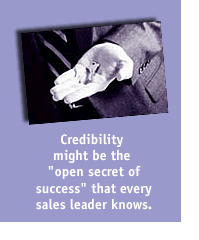
It's All About Trust
| Ïðîäàæè | ||||
| Sales.com | ||||
| Selling... | ||||
by Stephen E. Heiman, Diane Sanchez with Tad Tuleja
The other day, a friend of ours went shopping for some camping equipment over the Internet. It didn't take long before he found exactly what he wanted. Three different sites had the gear in stock, and prices were all well below retail. But instead of making the purchase online, he ended up driving down to the local sporting goods store and paying retail for the exact same equipment. Why?
 "I
didn't know a thing about any of the companies," our friend explained.
"I asked around and couldn't find anyone who had had any experience with
them either. I just couldn't bring myself to take a chance on an unknown,
even if I could have saved a few dollars. It was easier just to buy it
locally."
"I
didn't know a thing about any of the companies," our friend explained.
"I asked around and couldn't find anyone who had had any experience with
them either. I just couldn't bring myself to take a chance on an unknown,
even if I could have saved a few dollars. It was easier just to buy it
locally."
In effect, what our friend was saying was that none of the Internet companies had any credibility with him. That's not to say they weren't great companies. It's just that they hadn't established any track record with our friend (or any of his friends). Credibility is quite possibly the biggest obstacle facing Internet companies. Getting people to buy from a company they know nothing about (or a product they know nothing about) is a tremendous challenge. But Internet companies aren't the only ones that should be concerned with credibility. It affects all salespeople, no matter how or what they're selling.
In a previous article, we wrote about the ways you can improve your personal credibility, as well as that of your company. In this article, we'd like to revisit the credibility concern. This time we'll focus on why it's so important to improve your credibility.
During the Watergate hearings of the early 1970s, novelty stores carried a poster of Richard Nixon that depicted the beleaguered President over the caption "Would you buy a used car form this man?" The photograph made him look like the prototypically devious used car dealer. The implication was that Tricky Dick was no more to be trusted than Slippery Sam.
Whether or not this characterization was fair, the photograph drew vividly on the old folklore about shady used car dealers, and it made a valid point about customer perception. If you can't convince your potential buyers that you can be trusted, you're no better off than a President facing impeachment. In all sound selling—in all selling where long–term success is important—establishing your personal credibility, and that of your company, is a must. We suggest that credibility might even be the must—the "open secret of success that every sales leader knows."
A potential customer
will be reluctant to agree to a sale for five basic reasons:
Any combination of these elements can prove to be the undoing of a potential sale. But one of them stands out. The last item, lack of trust, kills more sales than the other four reasons combined.
The implication for the professional seller is dramatic. No matter what else you do well, if you don't have credibility with your customers, you're going to lose. Nobody buys from a person he doesn't think can be trusted.
There are exceptions. If you are the only available supplier for a given product or service and a customer is desperate to have it—in other words, if the customer thinks there's no alternative—then it's possible to make a no–credibility or low–credibility sale. You can also trick some inattentive or impulsive buyers into trusting you temporarily when common sense says they should not. But such situations are rare. And you cannot build a business on this basis. If you want to succeed in Win–Win selling—that is, if you want to develop satisfied customers, great referrals, repeat business, and enduring relationships—then you must have credibility.
Adapted from The New Conceptual Selling Stephen E. Heiman, Diane Sanchez with Tad Tuleja © 1999 by Miller Heiman, Inc., All rights reserved with permission of Warner Books. Inc.